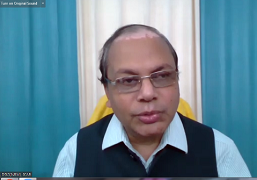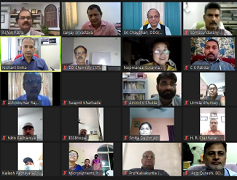31st October, 2020, Bhopal
The ICAR-Indian Institute of Soil Science, Bhopal, Madhya Pradesh organized a National Webinar on “Quality Improvement and Proficiency Testing of Soil Laboratories in India: Towards Improving the Quality of Analytical Data and Harmonization of Soil Test Methods” today.


In his inaugural address, Dr. S.K. Chaudhari, Deputy Director General (Natural Resource Management), ICAR stressed on the strong need to maintain the quality standards in soil testing. Accentuating on developing the uniform protocols of soil testing, he also emphasized on the need to establish a soil testing network in India for ensuring the guidance and quality control system.
Dr. Anupam Mishra, Vice-Chancellor, Central Agricultural University, Imphal, Assam highlighted the major role that the soil test based fertilizer nutrient recommendations have to play in doubling the farmers’ income by reducing the cost and increasing the farmers’ productivity.
Smt. Nopmanee Suvannang, Chairperson, Global Soil Laboratory Network (GLOSOLAN), FAO apprised the participants about the activities of Global Soil Partnership (GSP). She outlined the GLOSOLAN’s objectives to improve the labs’ quality through regular training; harmonization of Standard Operating Procedures (SOPs) for the interpretation of data across the laboratories, etc.
Earlier, in his welcome address, Dr. Ashok K. Patra, Director, ICAR-IISS, Bhopal, Madhya Pradesh briefed about the purpose of the National Webinar and expressed the need to create a National Network of Soil Testing Laboratories in India.
The Webinar was aimed at apprising the participants about the whole process of Quality Improvement and Proficiency Testing.
Around 300 participants representing the Agricultural Universities, ICAR Institutes, Krishi Vigyan Kendras, State Departments of Agriculture from across the country virtually attended the Webinar.
(Source: ICAR-Indian Institute of Soil Science, Bhopal, Madhya Pradesh)







फेसबुक पर लाइक करें
यूट्यूब पर सदस्यता लें
X पर फॉलो करना X
इंस्टाग्राम पर लाइक करें